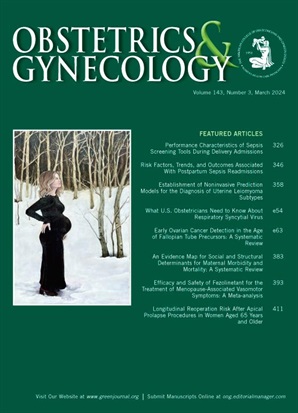Access to Obstetric and Gynecologic Care for Patients With Disabilities: ACOG Committee Statement No. 18.
IF 5.7
2区 医学
Q1 OBSTETRICS & GYNECOLOGY
引用次数: 0
Abstract
Although the Americans with Disabilities Act has been the law for more than 30 years, individuals with disabilities still face substantial barriers to health care and are at higher risk of receiving inadequate care than those without disabilities. It is important that obstetrician-gynecologists are aware of best practices for caring for their patients with disabilities, as well as how to adjust their offices, workflows, and practice patterns to be inclusive of all patients. Obstetrician-gynecologists and other reproductive health care professionals should understand the barriers that prevent disabled people from accessing reproductive health care. This is critical in identifying inequities and informing patient-centered approaches to services. Patients with disabilities should have access to the same health care as all patients, including all age-appropriate screening tests. It is important that health care teams acknowledge their inherent biases and offer and facilitate access to appropriate care, including recommended screening tests. Increasing training and exposure to individuals with different disabilities during medical training programs will not only help improve the lack of experience, but also help challenge the implicit and explicit biases that currently exist in health care.残疾人获得产科和妇科护理:ACOG委员会第18号声明。
尽管《美国残疾人法》已经实施了30多年,但残疾人在获得保健服务方面仍然面临着重大障碍,而且与非残疾人相比,他们更有可能得不到充分的护理。重要的是,妇产科医生意识到照顾残疾患者的最佳做法,以及如何调整他们的办公室,工作流程和实践模式,以包容所有患者。妇产科医生和其他生殖保健专业人员应该了解阻碍残疾人获得生殖保健的障碍。这对于确定不公平现象和告知以患者为中心的服务方法至关重要。残疾患者应获得与所有患者相同的保健服务,包括所有适合其年龄的筛查测试。重要的是,卫生保健小组必须承认其固有的偏见,并提供和便利获得适当的护理,包括推荐的筛查测试。在医疗培训项目中增加对不同残疾个体的培训和接触,不仅有助于改善经验的缺乏,而且有助于挑战目前在医疗保健中存在的隐性和显性偏见。
本文章由计算机程序翻译,如有差异,请以英文原文为准。
求助全文
约1分钟内获得全文
求助全文
来源期刊

Obstetrics and gynecology
医学-妇产科学
CiteScore
11.10
自引率
4.20%
发文量
867
审稿时长
1 months
期刊介绍:
"Obstetrics & Gynecology," affectionately known as "The Green Journal," is the official publication of the American College of Obstetricians and Gynecologists (ACOG). Since its inception in 1953, the journal has been dedicated to advancing the clinical practice of obstetrics and gynecology, as well as related fields. The journal's mission is to promote excellence in these areas by publishing a diverse range of articles that cover translational and clinical topics.
"Obstetrics & Gynecology" provides a platform for the dissemination of evidence-based research, clinical guidelines, and expert opinions that are essential for the continuous improvement of women's health care. The journal's content is designed to inform and educate obstetricians, gynecologists, and other healthcare professionals, ensuring that they stay abreast of the latest developments and best practices in their field.
 求助内容:
求助内容: 应助结果提醒方式:
应助结果提醒方式:


